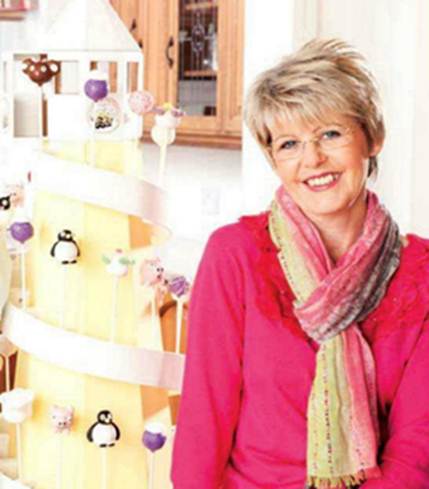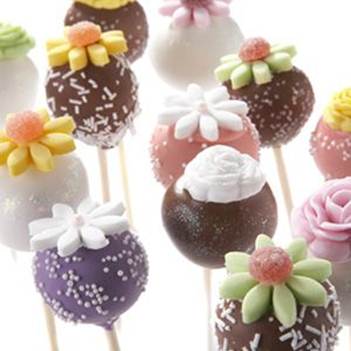Three women, who make break, cake and cake
pops, tell Emma Pritchard how they cooked up a recipe for success.
Dawn Hunt, 50, is married with a daughter and three stepsons.
She set up The Ipsy Doodle Cake Pop Factory with Sue Crosbie, 48, who she met
when they were both working at a department store. They live in West Yorkshire.

“Together
we tapped into a new trend – our cake pops are the new cupcake!”
The idea Sue
and I met in February 2010 and instantly hit it off. We were both passionate
about food and eager to set up our own business. When Sue showed me a cake pop
recipe book that she’d found on an American website, I knew we’d found a niche
in the UK. Cupcakes had already saturated the market, but these were new and
fun, and the design and flavour possibilities seemed endless. We decided to
pool our experience and savings.

A selection of Ipsy Doodle Cake Pops
What happened next We left our jobs in July, supported by husbands, and spent three
months testing cake pop recipes at home, using a chocolate melter from Argos!
At first, we couldn’t get the consistency right and they kept falling off the
stick, but we adjusted the ingredients until we had a product that held its
shape and tasted great. Opening a shop from the start would have been a huge
risk, so we paid a web designer friend of Sue’s husband £5,500 to create an
online shopping cart for us. We pooled our savings and paid £26,000 to convert
Sue’s garage into a commercial kitchen, with stainless-steel work surfaces,
large-scale melting pots and a packing area. We had hygiene checks carried out,
and trialled various types of packaging, from cellophane bags to boxes, to see
which ones survived best in the post. We went with a local manufacture, who
made bespoke boxes with our logo and the ingredients list printed on them. We
agreed to buy in bulk – 1,500 per order – so they each cost less than a pound.
When we wrote our business plan, we had targeted our product at children – my
daughter is grown up, but Sue’s is six – in fact, we actually have more
corporate clients.
Where we are now On our first day of trading, we sat in our shiny new kitchen with
no orders and the telephone never rang. It was a tense time, but it showed we
couldn’t wait for business to come to us. We cold-called local farm shops and
delis, joined networking groups and asked for coverage in local press. Orders
trickled in slowly – one box of eight for an anniversary, two for a birthday –
but word started to spread. In December, we paid £250 for a stall at a two-day
Christmas fair in Wetherby, and the 500 cake pops we’d taken sold out at a
promotional price of £2 each. We had a lot of orders as a result. We were also
commissioned to make light bulb-shaped cake pops for a local electrical company
to send out to its UK-based clients, and we’re now stocked in five local food
shops and a bridal shop in Cambridge. We make around 450 cake pops a day and
sell in batches of eight, which cost between £20 and £24. We’re experimenting
with a range of dessert flavours, such as tiramisu, sticky toffee pudding and
lemon meringue. When we started, we took half an hour to make each cake pop,
but now it takes one minute. We hand pack them, calling on friends and family
to help during the busy Christmas, Valentine’s and Easter periods.
Glitches
Some courier companies were better at delivering delicate parcels than others,
so it took longer than anticipated to find one to work with. Then cost was an
issue, especially on smaller orders – there was a set £7.50 charge for packages
up to 10kg. We felt this was too high so charged customers £6, absorbing the
cost in our profit margin. As orders increase, we have been able to negotiate
better fees.
My tips Do
your research. Trawl the Internet to see what other competition is out there,
then ask them for advice. We often get calls from new start-ups and, if we’d
had their confidence, it could have saved a lot of time with planning.
Business in figures
Launched October 2011
Start-up costs £35,000
Current turnover £100,000
Ipsydoodlecakepopfactory.co.uk